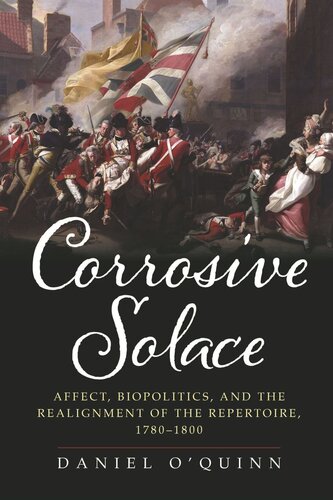

Most ebook files are in PDF format, so you can easily read them using various software such as Foxit Reader or directly on the Google Chrome browser.
Some ebook files are released by publishers in other formats such as .awz, .mobi, .epub, .fb2, etc. You may need to install specific software to read these formats on mobile/PC, such as Calibre.
Please read the tutorial at this link: https://ebookbell.com/faq
We offer FREE conversion to the popular formats you request; however, this may take some time. Therefore, right after payment, please email us, and we will try to provide the service as quickly as possible.
For some exceptional file formats or broken links (if any), please refrain from opening any disputes. Instead, email us first, and we will try to assist within a maximum of 6 hours.
EbookBell Team

0.0
0 reviewsIn Corrosive Solace, Daniel O’Quinn argues that the loss of the American colonies instantiated a complex reorganization in sociability and politics in the British metropole that has had long-lasting effects on British national and imperial culture, which can be seen and analyzed within its performative repertoire.
In Corrosive Solace, Daniel O’Quinn argues that the loss of the American colonies instantiated a complex reorganization in sociability and politics in the British metropole that has had long-lasting effects on British national and imperial culture, which can be seen and analyzed within its performative repertoire. He examines how the analysis of feeling or affect can be deployed to address the inchoate causal relation between historical events and their mediation. In this sense, Corrosive Solace’s goals are twofold: first, to outline the methodologies necessary for dealing with the affective recognition of historical crisis; and second, to make the historically familiar strange again, and thus make visible key avenues for discussion that have remained dormant. Both of these objectives turn on recognition: How do we theorize the implicit affective recognition of crisis in a distant historical moment? And how do we recognize what we, in our present moment, cannot discern?
Corrosive Solace addresses this complex cultural reorientation by attending less to “new” cultural products than to the theoretical and historical problems posed by looking at the transformation of “old” plays and modes of performance. These “old” plays—Shakespeare, post-Restoration comedy and she-tragedy—were a vital plank of the cultural patrimony, so much of O’Quinn’s analysis lies in how tradition was recovered and redirected to meet urgent social and political needs. Across the arc of Corrosive Solace, he tracks how the loss of the American War forced Britons to refashion the repertoire of cultural signs and social dispositions that had subtended its first empire in the Atlantic world in a way more suited to its emergent empire in South Asia.